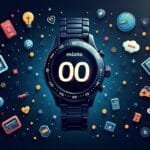“`html
Can Wearable Heart Rate Monitors Be the Key to Unlocking a Stress-Free Future?
In today’s fast-paced world, managing stress has become an essential aspect of maintaining overall well-being. With wearable technology advancing at breakneck speed, Heart Rate Monitoring Wearables have emerged as a game-changer in helping individuals track their physical and mental health. By providing real-time data on heart rate variability, these innovative devices enable users to identify patterns and make informed decisions about their lifestyle choices.
As we continue to navigate the ever-evolving landscape of wearable gadgets and technology trends, it’s essential to stay ahead of the curve when it comes to stress monitoring wearables. In this article, we’ll delve into the world of Heart Rate Monitoring Wearables, exploring the top picks for fitness and wellness enthusiasts. From budget-friendly options to high-end devices, our comprehensive guide will help you find the perfect wearable companion for your journey towards a healthier, happier you.
Whether you’re an avid athlete or simply looking to improve your mental well-being, understanding how Heart Rate Monitoring Wearables can benefit your lifestyle is crucial. By making informed choices about your wearables, you’ll be better equipped to manage stress, optimize your workouts, and unlock a more balanced future. So, let’s dive into the best Heart Rate Monitoring Wearables on the market and discover how they can revolutionize your approach to fitness and wellness.
What are Heart Rate Monitoring Wearables?
Heart Rate Monitoring Wearables are devices designed to track your heart rate in real-time, providing insights into your cardiovascular health and stress levels. These devices use sensors to measure your pulse and often include additional features like step counting, sleep tracking, and stress monitoring.
Why Are Heart Rate Monitoring Wearables Important?
The importance of Heart Rate Monitoring Wearables lies in their ability to provide continuous health data. This data can help users:
- Monitor cardiovascular health
- Identify stress patterns
- Optimize fitness routines
- Improve sleep quality
By understanding these metrics, individuals can make informed decisions about their health and lifestyle, potentially preventing serious health issues.
Top 10 Devices Revolutionizing Your Health in 2025
As technology evolves, so do the capabilities of Heart Rate Monitoring Wearables. Here are the top 10 devices that are set to revolutionize health monitoring in 2025:
- Apple Watch Series 9: Known for its advanced heart rate monitoring and ECG capabilities.
- Fitbit Charge 6: Offers comprehensive health tracking, including stress management tools.
- Garmin Venu 3: Features a robust set of fitness and health metrics, including pulse oximetry.
- Samsung Galaxy Watch 6: Provides real-time heart rate monitoring and stress tracking.
- Oura Ring 4: A sleek, ring-style wearable that tracks heart rate variability and sleep.
- Whoop Strap 5.0: Focuses on recovery and strain, offering detailed heart rate analytics.
- Polar Vantage V3: Designed for athletes, with advanced heart rate and performance metrics.
- Withings ScanWatch 2: Combines traditional watch design with advanced health tracking features.
- Huawei Watch GT 4: Offers long battery life and comprehensive health monitoring.
- Xiaomi Mi Band 8: A budget-friendly option with essential heart rate and fitness tracking.
These devices not only track heart rate but also offer a range of features that cater to different health and fitness needs.
How Do Heart Rate Monitoring Wearables Work?
Heart Rate Monitoring Wearables typically use optical sensors to detect blood flow through the skin. This technology, known as photoplethysmography (PPG), measures changes in light absorption to calculate heart rate. Some advanced devices also use electrocardiogram (ECG) sensors for more precise readings.
Comparing Heart Rate Monitoring Wearables
When choosing a Heart Rate Monitoring Wearable, it’s important to consider factors like features, price, and compatibility. Here’s a comparison of some popular models:
| Device | Features | Price | Compatibility |
|---|---|---|---|
| Apple Watch Series 9 | ECG, GPS, Fitness Tracking | $399 | iOS |
| Fitbit Charge 6 | Stress Management, Sleep Tracking | $179 | iOS, Android |
| Garmin Venu 3 | Pulse Oximetry, Music Storage | $349 | iOS, Android |
| Samsung Galaxy Watch 6 | Heart Rate, Stress Tracking | $299 | iOS, Android |
These comparisons can help you decide which device best suits your needs and budget.
What Features Should You Look for in Heart Rate Monitoring Wearables?
When selecting a Heart Rate Monitoring Wearable, consider the following features:
- Accuracy: Ensure the device provides reliable heart rate data.
- Battery Life: Look for wearables with long-lasting batteries.
- Water Resistance: Ideal for swimmers or those who sweat heavily.
- App Compatibility: Check if the device syncs with your smartphone.
These features can significantly impact your experience and the effectiveness of the wearable.
How Can Heart Rate Monitoring Wearables Help Manage Stress?
By tracking heart rate variability (HRV), Heart Rate Monitoring Wearables can provide insights into your stress levels. A lower HRV often indicates higher stress, while a higher HRV suggests better stress management. These wearables can help you:
- Identify stress triggers
- Implement relaxation techniques
- Monitor progress over time
Understanding these patterns can lead to more effective stress management strategies.
Are Heart Rate Monitoring Wearables Accurate?
Most Heart Rate Monitoring Wearables offer accurate readings for everyday use. However, factors like skin tone, body movement, and device placement can affect accuracy. For medical-grade precision, devices with ECG capabilities are recommended.
Future Trends in Heart Rate and Stress Monitoring Wearables
The future of Heart Rate Monitoring Wearables is promising, with trends pointing towards:
- Integration with AI for personalized health insights
- Improved sensor technology for better accuracy
- Expanded health metrics, including mental health monitoring
These advancements will make wearables even more integral to personal health management.
Conclusion: Embrace the Future of Health Monitoring
As we look towards 2025, Heart Rate Monitoring Wearables are set to play a crucial role in personal health management. By choosing the right device, you can gain valuable insights into your heart health and stress levels, paving the way for a healthier, more balanced life.
For more information on heart rate and stress monitoring wearables, visit Wearable Gear Trends and explore our dedicated section on Heart Rate and Stress Monitoring Wearables.
Additional Resources
- Healthline: Best Heart Rate Monitors
- CNET: Best Fitness Trackers
- Whoop: Understanding Heart Rate Variability
Stay informed and subscribe to our updates for the latest in wearable technology trends. Follow us at Wearable Gear Trends and Heart Rate and Stress Monitoring Wearables.
“`






